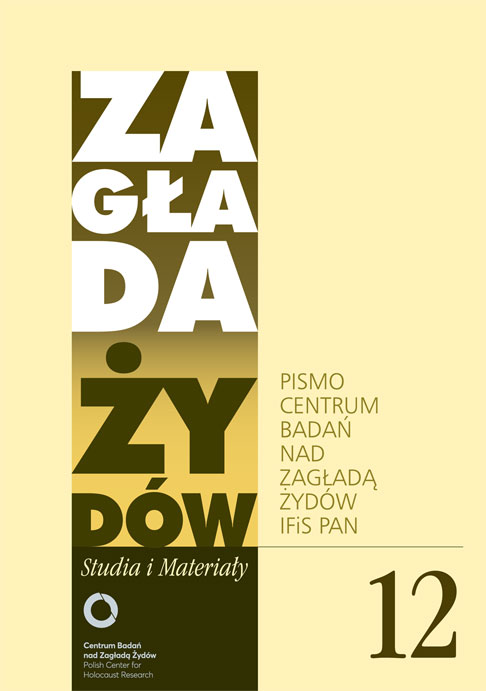Demon pojednania. Dyskurs o współczesnych Sprawiedliwych w powieści popularnej
Zagłada Żydów. Studia i Materiały, Nr 12 (2016), strony: 395-409
Data publikacji: 2016-11-30
Abstrakt
The author analyzes depictions of the Righteous in several Polish popular novels and the accompanying discourse on rescuing. She proves that in popular fiction such depictions dominate over the reckoning discourse, connected with the Polish shared responsibility for the Holocaust. Tomczok analyzes the reasons for that dominance, referring to the Philo-Semitic violence category described by Elżbieta Janicka and Tomasz Żukowski. She devotes special attention to Maja Wolny’s novel Czarne liście and the controversy over the presentation of the pogrom in Kielce, and, first and foremost, this book’s dependence on the scholarly achievements of the scholars affiliated with the Center for Holocaust Research.
Słowa kluczowe
powieść popularna, Sprawiedliwi, ratowanie, przemoc, filosemityzm, pogrom kielecki, żołnierze wyklęci
Licencja
Copyright (c) 2016 Zagłada Żydów. Studia i Materiały

Utwór dostępny jest na licencji Creative Commons Uznanie autorstwa – Użycie niekomercyjne – Bez utworów zależnych 4.0 Międzynarodowe.
https://creativecommons.org/licenses/by-nc-nd/4.0
Inne teksty tego samego autora
- Jacek Leociak, Marta Tomczok, Afektywny kicz holokaustowy – wprowadzenie , Zagłada Żydów. Studia i Materiały: Nr 17 (2021)
- Marta Tomczok, Getto łódzkie we współczesnej literaturze dla dzieci i młodzieży. Krytyka „nowej wrażliwości” , Zagłada Żydów. Studia i Materiały: Nr 16 (2020)
- Marta Tomczok, Po co dzisiaj jest Zagłada, czyli poetycki survival , Zagłada Żydów. Studia i Materiały: Nr 17 (2021)
- Marta Tomczok, „Polecieć tam, gdzie nie ma getta, szopu…” Dziennik Rutki Laskier między nekroestetyką a nekropolityką , Zagłada Żydów. Studia i Materiały: Nr 14 (2018)
- Marta Tomczok, Religijny kicz holokaustowy. Zarys zjawiska , Zagłada Żydów. Studia i Materiały: Nr 15 (2019)
- Marta Tomczok, Zatrucie. Piołun i popiół… trzydzieści lat później , Zagłada Żydów. Studia i Materiały: Nr 13 (2017)
- Marta Tomczok, Anna Mach, Świadkowie świadectw. Postpamięć Zagłady w polskiej literaturze najnowszej; Małgorzata Wójcik-Dudek, W(y)czytać Zagładę. Praktyki postpamięci w polskiej literaturze XXI wieku dla dzieci i młodzieży , Zagłada Żydów. Studia i Materiały: Nr 13 (2017)
- Marta Tomczok, Kinga Piotrowiak-Junkiert, Świadomość zwrócona przeciwko sobie samej. Imre Kertész wobec Zagłady , Zagłada Żydów. Studia i Materiały: Nr 12 (2016)
 English
English
 Polish
Polish




